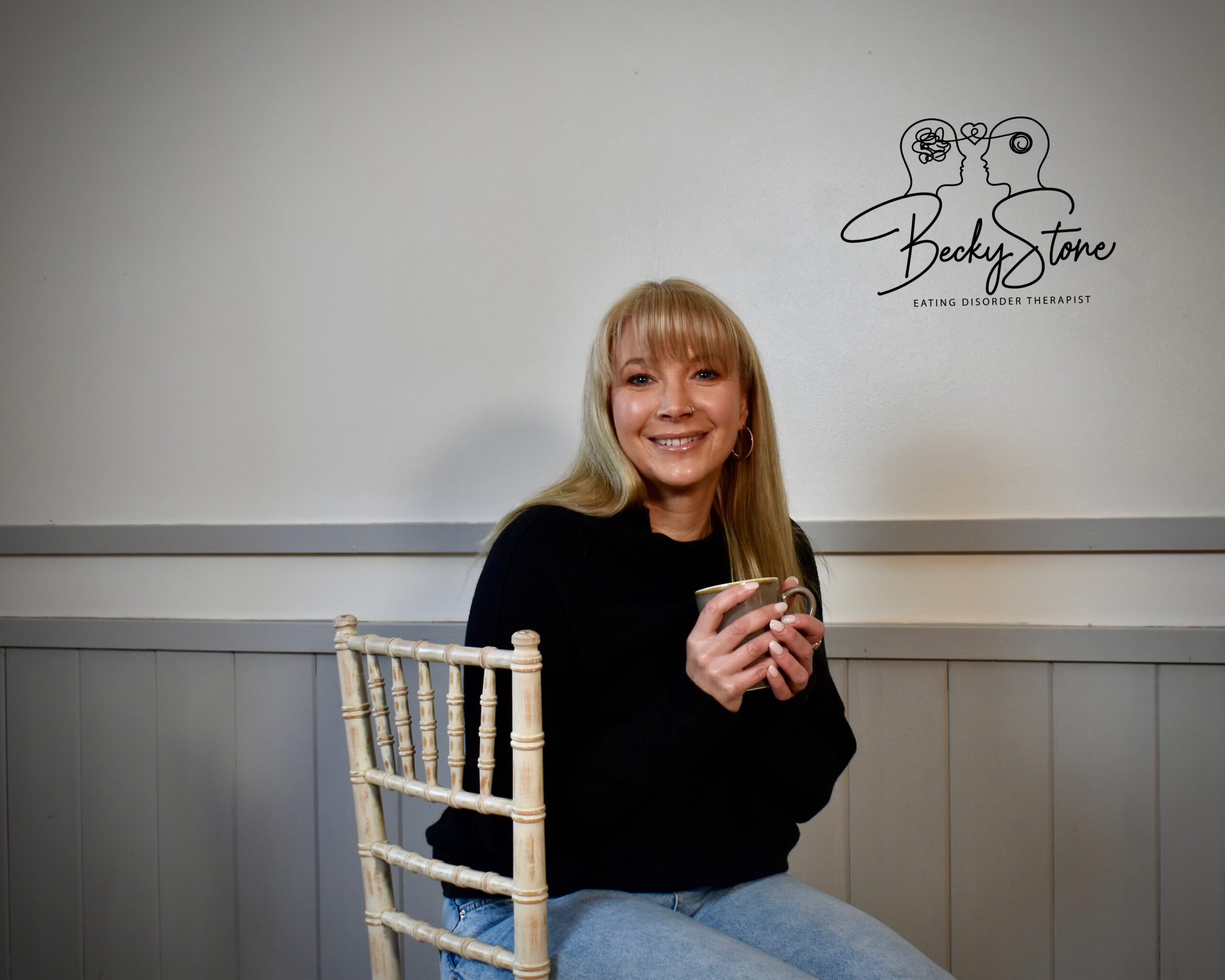Recovery that supports your body, your voice, and your story.
Begin Your Journey to Healing
Discover a compassionate approach to overcoming bulimia, where healing your relationship with food and your body is the ultimate goal.
The Silent Struggle Within
Breaking Free from the Cycle of Shame
What Bulimia Therapy Offers
If you’re reading this, I want to acknowledge how much strength it takes to get this far.
Maybe you’ve been diagnosed with bulimia, or maybe you haven’t. Maybe on the outside, you look confident and put-together.
But on the inside? You feel ashamed, stuck, and completely out of control.
➔ You tell yourself you’ve got this… but the binges keep happening.
➔ You’re terrified of gaining weight, and it’s taking over your thoughts.
➔ You want help but also want to hide what’s been happening.
➔ You feel exhausted from trying to “do better,” only to find yourself back in the same loop.
This is the part where most people give up.
But you’re not like most people. You’re here. And that matters.
01
Understanding Underlying Causes
02
Rebuilding Body Trust
03
Emotional Regulation
04
Personalized Healing Plans
What Bulimia Therapy Actually Looks Like
A Personalized Path to Recovery
The goal isn’t just to “stop bingeing.” The goal is healing your relationship with food, your body, and yourself.
Together, we’ll explore:
– What’s driving the behaviours
– The stories and beliefs you’ve inherited about your body
– How those thoughts are often projections of pain, control, or past experiences
– Why your body doesn’t deserve the blame and how to begin apologising to it
➔ What if your harshness toward your body isn’t about your body?
➔ What if you could offer it kindness right now without changing a thing?
Tools for Healing
– Emotional regulation without food as a coping strategy
– Reframing inner self-talk
– Stopping comparison cycles
– Releasing the “perfect life” pressure
– Making peace with who you are now
Recovery is not one-size-fits-all. That’s why your therapy plan is built around you.
Why Personalised Bulimia Treatment Matters
Bulimia is complex. It’s not just about eating habits; it’s often tangled with perfectionism, trauma, control, and identity.
Generic advice won’t get you where you want to go. But compassionate, tailored support can.
➔ Understand the real roots behind your eating disorder
➔ Explore your relationship with your body not as an enemy, but as an ally
➔ Rebuild trust in your body, hunger cues, and emotions
➔ Feel seen, supported, and understood
You don’t need to keep doing this alone.
🌐 [Visit BEAT Eating Disorders for more resources](https://www.beateatingdisorders.org.uk/)
What Bulimia Therapy Actually Looks Like
The goal isn’t just to “stop bingeing.” The goal is healing your relationship with food, your body, and yourself.
Together we’ll explore:
– What’s really driving the behaviours
– The stories and beliefs you’ve inherited about your body
– How those thoughts are often projections of pain, control, or past experiences
– Why your body doesn’t deserve the blame, and how to begin apologising to it
➔ What if the harshness you feel toward your body isn’t really about your body?
➔ What if you could offer it kindness right now without changing a thing?
Body Image: A Deeper Understanding
Tools for Healing
– Emotional regulation without food as a coping strategy
– Reframing inner self-talk
– Stopping comparison cycles
– Releasing the “perfect life” pressure
– Making peace with who you are now
Recovery is not one-size-fits-all. That’s why your therapy plan is built around you.
Why Personalised Bulimia Treatment Matters
Bulimia is complex. It’s not just about eating habits; it’s often tangled with perfectionism, trauma, control, and identity.
Generic advice won’t get you where you want to go. But compassionate, tailored support can.
➔ Understand the real roots behind your eating disorder
➔ Explore your relationship with your body,not as an enemy but as an ally
➔ Rebuild trust in your body, hunger cues, and emotions
➔ Feel seen, supported, and understood
You don’t need to keep doing this alone.
🌐 [Visit BEAT Eating Disorders for more resources](https://www.beateatingdisorders.org.uk/)
Schedule Your Free Consultation
Ready to Talk?
You don’t have to commit to anything right now. But if you’re curious about how therapy for bulimia could help, I’d love to hear from you.
Book a free 20-minute informal chat with me, a qualified counsellor and clinical supervisor based in Canterbury, Kent. I specialise in Eating Disorder therapy that focuses on the whole person, not just the behaviour.
Meet Becky, Your Supportive Guide
Hi, I’m Becky.
I’m a specialist Eating Disorder counsellor based in Canterbury. I blend professional experience with warmth, lived insight, and therapy that meets you where you are.
I believe recovery isn’t linear, and it doesn’t require perfection.
You don’t have to do it alone. Let’s talk.
Insights and Stories from the Journey to Recovery
When Your Child Is Waiting for CAMHS: What Parents Can Do Right Now
When you hear the words “We’re referring your child to CAMHS,” it can feel like both relief and panic. Relief that someone finally recognises your child’s struggle, and panic because the waiting list can feel endless. Every week, I receive calls from parents in tears,...
How to Cope with a Relationship Breakdown: 5 Ways to Protect Your Heart and Mental Health
When a relationship ends, it’s not just the end of a partnership, it’s the loss of dreams, routines, and identity. Whether the split was sudden or slow, healing is rarely linear. In this blog, I’ll share five ways to take care of yourself through the emotional fallout...
Empty Nest, ADHD Brain: When Your Children Leave and You Fall Apart
Discover how to thrive during life's transitions, even when the path feels uncertain. This page offers insights and support for navigating the challenges and opportunities that come with change.They leave for uni, or they move out, and you’re proud. But inside? It...





